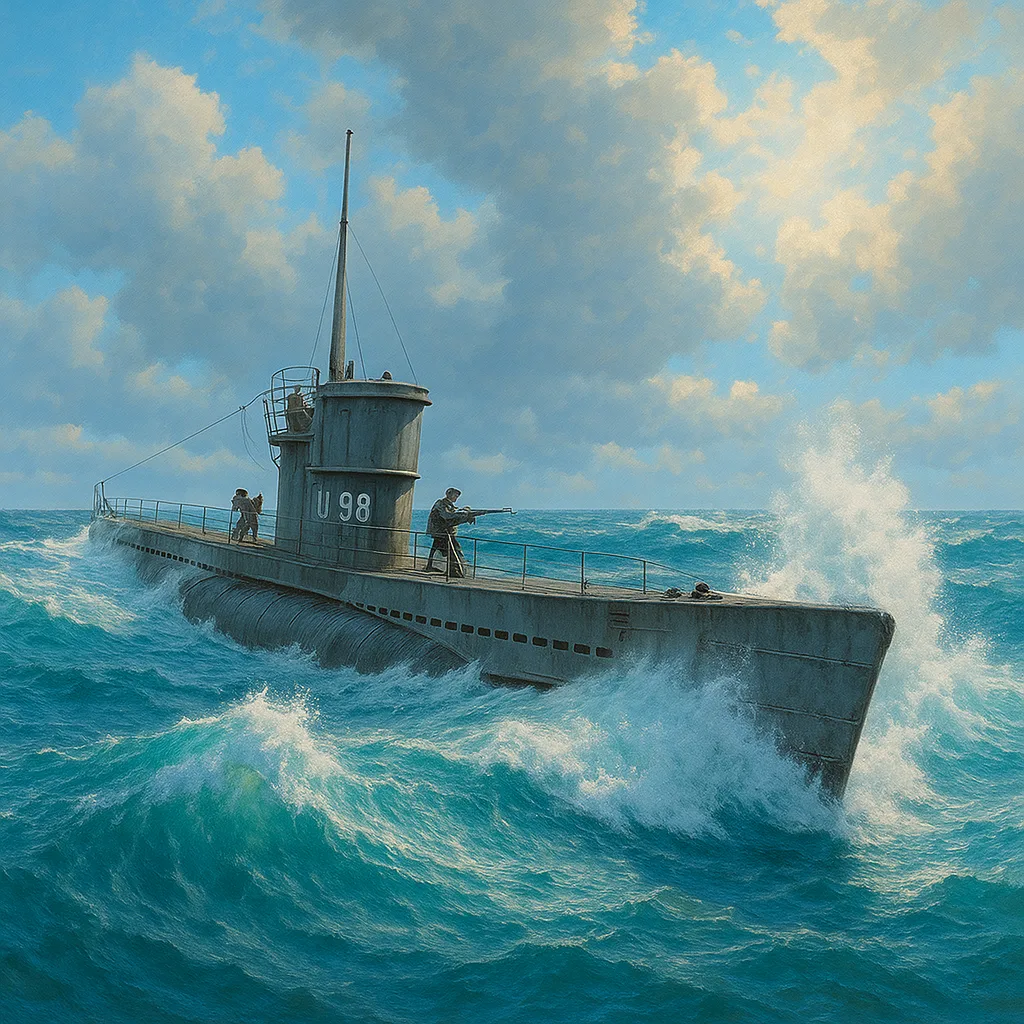Direct stream links

The story of U-98 The Last Dive, a German Type VIIC U-boat
Length: 5 min 10 Sec
Release Date Spotify: 2025 Aug 8th

The inside of U-98
Always smelled like diesel and sweat after several weeks patrol mission dodging destroyers, braving storms, and living in a steel tube packed tighter than a sardine can. We’d sunk a freighter five nights ago. I still remember the glow on the horizon, the sound of cracking steel, the cheers from our men that quickly fell back into silence. Every kill meant dozens dead. War doesn’t let you forget that for long.
The mission:
All started from Lorient under the cover of darknes. Tactic to leave Lorient changed several times from
- Daytime to spot enemy aircraft
- Nighttime to avoid been discovered by enemy aircraft
- Leave in convoy to keep eneny aircraft on safe distance
U98 mission:
To patrol the North Atlantic and disrupt Allied supply lines. Kapitänleutnant Robert Gysae, a seasoned and stoic commander, stood at the conning tower, scanning the horizon, the weight of war heavy on his shoulders. At this time of History U-98 had already made a name for herself with eight ships sunk in previous patrols. But this time, the seas felt different. The Allies had grown smarter. Convoys were larger, more heavily guarded, and the ocean seemed to bristle with hidden eyes.
Days into the patrol, sonar picked up the low thrum of a convoy. Slipping beneath the waves like a shadow, U-98 crept toward the target. In a daring night attack, Gysae ordered two torpedoes loosed. Moments later, a British freighter erupted into flame, lighting the sea like a second dawn.
But triumph turned quickly to tension. An escort destroyer spotted the periscope and charged. Depth charges hammered the ocean, sending shockwaves through the sub. Lights flickered. Men held their breath. U-98 dove deeper than ever before, creaking and groaning under the pressure.
For hours, they played a deadly game of cat and mouse. Finally, silence. The destroyer moved on, thinking U-98 destroyed. Inside the battered hull, the crew let out exhausted sighs. The boat had survived—barely.
The sea had grown quieter. We thought maybe we’d gotten lucky this time.
A week later, low on torpedoes and fuel, Gysae turned U-98 toward home. But she would never make it.
Then came November 15 1942.
The sonar pinged— Too fast. Too close and too Dangerous for a fragile uboat like U98
The HMS Wrestler was on us before we could dive deep enough. The captain Kapitänleutnant Gysae ordered silent running. We shut down everything. Even breathing felt like a sin to reduce sound
Then—BOOM. A depth charge hit nearby. The lights went out. The boat shuddered. Water sprayed from cracked valves.
“Blow ballast!” someone yelled. “We need to surface!”
But it was too late. The next charge hit us square. The pressure hull screamed, and I remember only a flash, the sound of twisting metal, then cold. Blinding cold.
I woke up floating. Wreckage all around me. Only one other man bobbed nearby. Everyone else… gone.
The ocean was quiet again